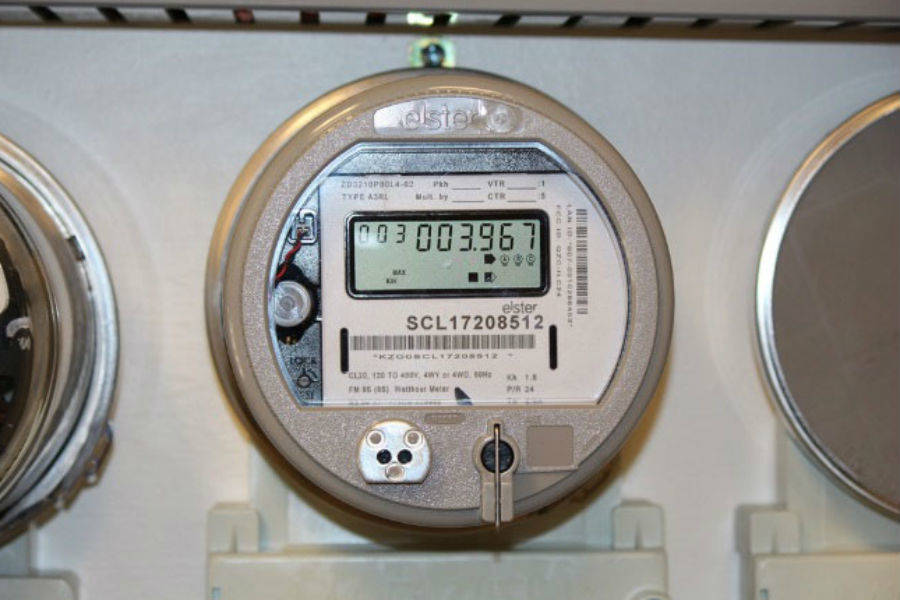This summer, Seattle City Light plans to begin the two-year rollout of its smart-metering system, which will use wireless meters to keep real-time track of the wattage customers use.
In Seattle City Light’s telling, this is a good thing. The benefits of smart meters are many. They are more accurate than traditional meters; they’re easier to read, since they transmit their data wirelessly, thus removing the need to have meter-readers go house-to-house; and they can keep better track of who’s using how much power when, data City Light says will be useful for conservation efforts.
For a small but dedicated group of smart-meter opponents, though, the coming rollout is anything but a cause for celebration. Citing health and privacy concerns, they have been fighting City Light’s deployment of smart meters for years. For their trouble, they’ve gotten accused of tinfoil-hat paranoia and little else. They won a small victory—though they wouldn’t use that word—when Seattle City Light created an opt-out program that allows people to refuse the new technology. But even that program is filled with caveats. First, it will cost you: $124.43 up front and $15.87 each billing cycle after that. If a smart meter has already been installed at your residence, you will also have to pay an extra $84.21 to get it pulled out and a traditional meter put back in (discounts for low-income customers apply to these charges). If you’re a renter, it will be up to your landlord to decide whether to opt out.
All told, the anti-smart-meter group Safe Utility Meters Alliance Northwest (SUMA-NW) says about 50 percent of all City Light customers are not eligible for opt-out as deployment approaches. To date, Seattle City Light spokesman Scott Thomsen says, fewer than 100 people have filed forms to opt out—though it’s still relatively early in the game, and that number is sure to grow as customers begin to receive notices that smart meters are coming to their neighborhoods.
That said, smart-meter opponents admit it’s been hard to get people to pay attention to their cause, and worry that the barriers to opting out will force people to accept the technology whatever their misgivings. “Most people don’t know about smart meters. I keep asking people at the checkout line at Madison Market, ‘Do you know what’s happening with smart meters?’ They say, ‘What are smart meters?’ ” says Jordan Van Voast, a volunteer with SUMA.
Van Voast is an acupuncturist, and his main qualm with the meters is the wireless radiation they put out to relay data to a central hub. The radiation is well below the threshold set by the government for safe levels, but Van Voast is skeptical of those guidelines. “I’m a health educator and professional and I’ve read lots of studies, and there are real concerns about the health issues,” he says.
However, these are the sorts of concerns that have gotten the smart-meter opponents labeled as kooks (“It doesn’t play well in the public,” Van Voast allows), so instead Van Voast points to the privacy concerns connected with the meters. At a time when our personal data is being mined, dissected, and sold, do we really want the government keeping track of when our lights are on or off? “It’s a basic principle of constitutional government: the right to be free and secure in your home of search and seizure. Basically, they can find out the intricate details of your life,” he says.
Phil Mocek, vice president of the Seattle Privacy Coalition, agrees that the granular nature of the meter data is problematic. “At a glance, this program likely sounds good to many people. Who wouldn’t like a better view of their home’s electrical usage? I would,” Mocek says in an e-mail. “But I do not want the electric company or their vendors to have more information about what goes on inside my home than the amount of electricity I used during a given billing cycle—it’s none of their business when I’m home with the lights on or when I’m away and the house is dark.”
Thomsen, though, says customers have nothing to be worried about, and corrects a reporter who uses the phrase “smart metering.” “We refer to it as advanced metering because this is a technology upgrade … enabling enhanced services for our customers,” he says. Customers will get to see detailed data of how they use energy, which could help them reduce how much they use, Thomsen says. The meters will also improve response time for power outages. Plus, meter readers won’t be tromping though people’s yards and burning lots of gas driving around, he adds. City Light says the radio frequencies emitted by the meters is less than that of a cell phone, and that all the data will be encrypted to protect it from hackers. Asked about the government itself having the data, all Thomsen can say is, “Our entire purpose is to deliver reliable, affordable electricity to our customers.”
None of that will convince people like Van Voast, though it won’t really matter in his case. He’s put $30,000 into solar panels that at times feed electricity onto the grid. City Light wants to keep better track of how much electricity is coming off those panels, so solar customers are among those not eligible to opt out.
“I’m still trying to get some help from the Seattle City Council, but it’s mostly a done deal from their viewpoint,” he says. “If worst comes to worst and I’m forced to take a smart meter, I’ll find ways to shield myself from radio-frequency radiation.” And, no, that won’t entail any tinfoil.
dperson@seattleweekly.com








